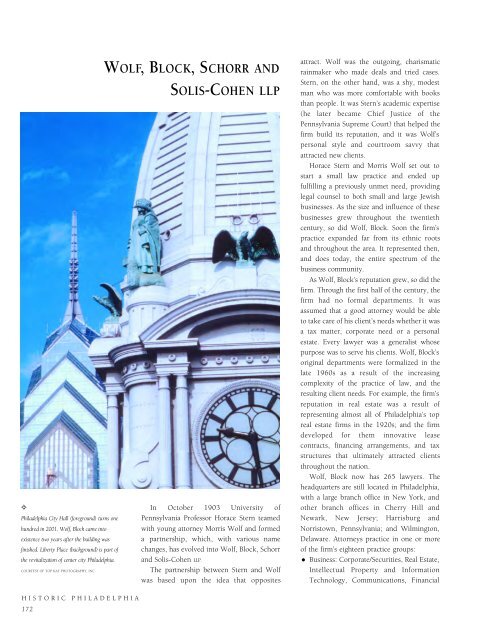Historic Philadelphia
An illustrated history of the city of Philadelphia, paired with the histories of companies, families and organizations that make the region great.
An illustrated history of the city of Philadelphia, paired with the histories of companies, families and organizations that make the region great.
Create successful ePaper yourself
Turn your PDF publications into a flip-book with our unique Google optimized e-Paper software.
✧<br />
<strong>Philadelphia</strong> City Hall (foreground) turns one<br />
hundred in 2001. Wolf, Block came into<br />
existence two years after the building was<br />
finished. Liberty Place (background) is part of<br />
the revitalization of center city <strong>Philadelphia</strong>.<br />
COURTESY OF TOP KAT PHOTOGRAPHY, INC.<br />
WOLF, BLOCK, SCHORR AND<br />
SOLIS-COHEN LLP<br />
In October 1903 University of<br />
Pennsylvania Professor Horace Stern teamed<br />
with young attorney Morris Wolf and formed<br />
a partnership, which, with various name<br />
changes, has evolved into Wolf, Block, Schorr<br />
and Solis-Cohen LLP.<br />
The partnership between Stern and Wolf<br />
was based upon the idea that opposites<br />
attract. Wolf was the outgoing, charismatic<br />
rainmaker who made deals and tried cases.<br />
Stern, on the other hand, was a shy, modest<br />
man who was more comfortable with books<br />
than people. It was Stern’s academic expertise<br />
(he later became Chief Justice of the<br />
Pennsylvania Supreme Court) that helped the<br />
firm build its reputation, and it was Wolf’s<br />
personal style and courtroom savvy that<br />
attracted new clients.<br />
Horace Stern and Morris Wolf set out to<br />
start a small law practice and ended up<br />
fulfilling a previously unmet need, providing<br />
legal counsel to both small and large Jewish<br />
businesses. As the size and influence of these<br />
businesses grew throughout the twentieth<br />
century, so did Wolf, Block. Soon the firm’s<br />
practice expanded far from its ethnic roots<br />
and throughout the area. It represented then,<br />
and does today, the entire spectrum of the<br />
business community.<br />
As Wolf, Block’s reputation grew, so did the<br />
firm. Through the first half of the century, the<br />
firm had no formal departments. It was<br />
assumed that a good attorney would be able<br />
to take care of his client’s needs whether it was<br />
a tax matter, corporate need or a personal<br />
estate. Every lawyer was a generalist whose<br />
purpose was to serve his clients. Wolf, Block’s<br />
original departments were formalized in the<br />
late 1960s as a result of the increasing<br />
complexity of the practice of law, and the<br />
resulting client needs. For example, the firm’s<br />
reputation in real estate was a result of<br />
representing almost all of <strong>Philadelphia</strong>’s top<br />
real estate firms in the 1920s; and the firm<br />
developed for them innovative lease<br />
contracts, financing arrangements, and tax<br />
structures that ultimately attracted clients<br />
throughout the nation.<br />
Wolf, Block now has 265 lawyers. The<br />
headquarters are still located in <strong>Philadelphia</strong>,<br />
with a large branch office in New York, and<br />
other branch offices in Cherry Hill and<br />
Newark, New Jersey; Harrisburg and<br />
Norristown, Pennsylvania; and Wilmington,<br />
Delaware. Attorneys practice in one or more<br />
of the firm’s eighteen practice groups:<br />
• Business: Corporate/Securities, Real Estate,<br />
Intellectual Property and Information<br />
Technology, Communications, Financial<br />
HISTORIC PHILADELPHIA<br />
172
















